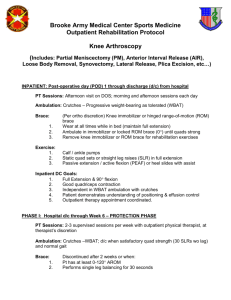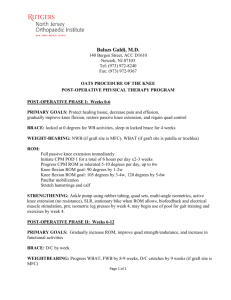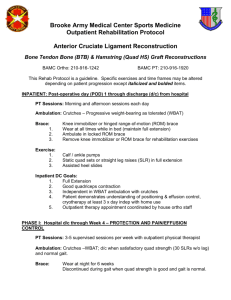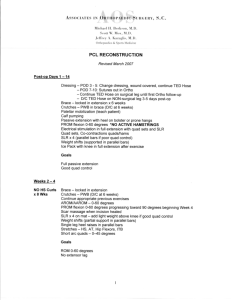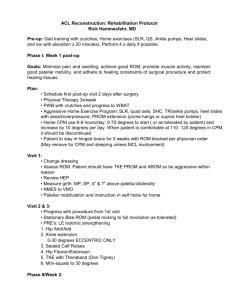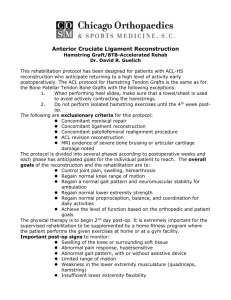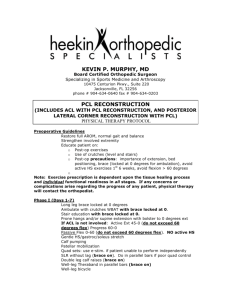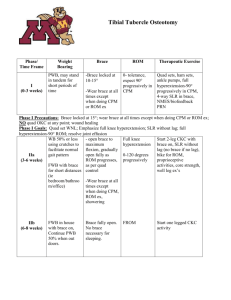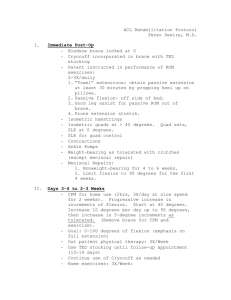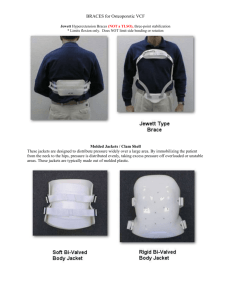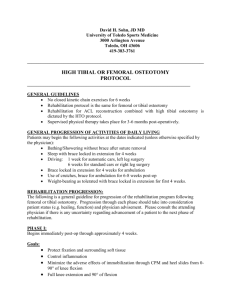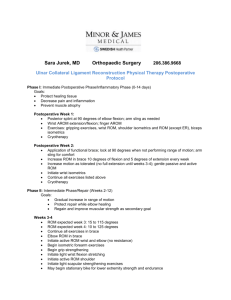ACL Reconstruction with Meniscus Repair
advertisement
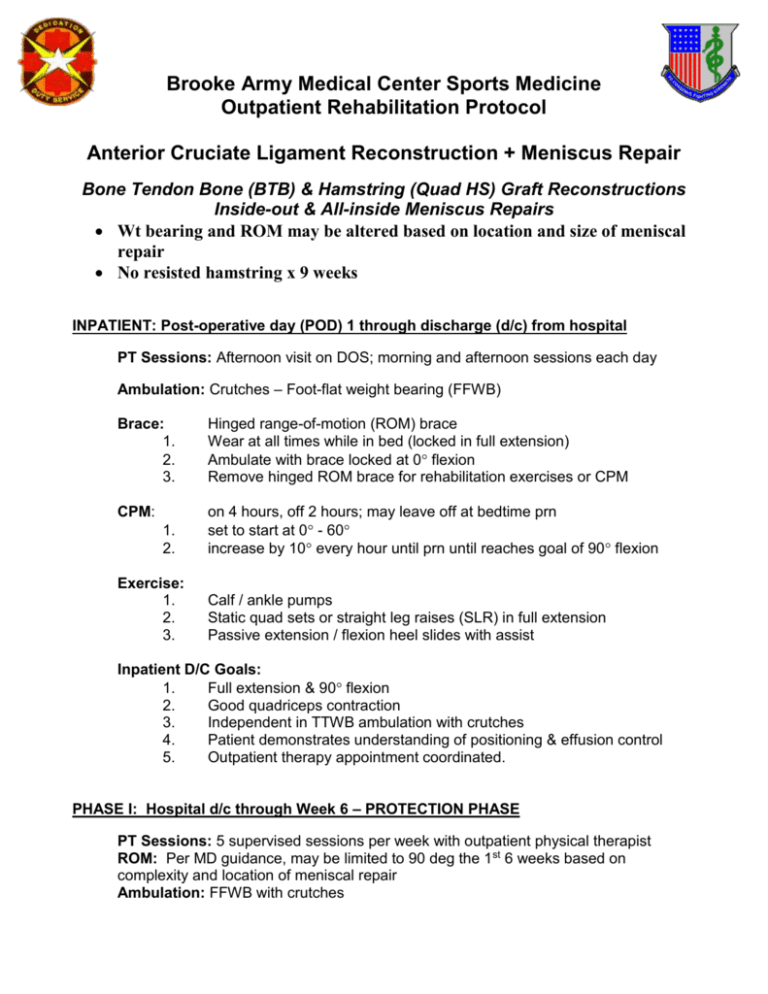
Brooke Army Medical Center Sports Medicine Outpatient Rehabilitation Protocol Anterior Cruciate Ligament Reconstruction + Meniscus Repair Bone Tendon Bone (BTB) & Hamstring (Quad HS) Graft Reconstructions Inside-out & All-inside Meniscus Repairs Wt bearing and ROM may be altered based on location and size of meniscal repair No resisted hamstring x 9 weeks INPATIENT: Post-operative day (POD) 1 through discharge (d/c) from hospital PT Sessions: Afternoon visit on DOS; morning and afternoon sessions each day Ambulation: Crutches – Foot-flat weight bearing (FFWB) Brace: 1. 2. 3. Hinged range-of-motion (ROM) brace Wear at all times while in bed (locked in full extension) Ambulate with brace locked at 0 flexion Remove hinged ROM brace for rehabilitation exercises or CPM CPM: on 4 hours, off 2 hours; may leave off at bedtime prn set to start at 0 - 60 increase by 10 every hour until prn until reaches goal of 90 flexion 1. 2. Exercise: 1. 2. 3. Calf / ankle pumps Static quad sets or straight leg raises (SLR) in full extension Passive extension / flexion heel slides with assist Inpatient D/C Goals: 1. Full extension & 90 flexion 2. Good quadriceps contraction 3. Independent in TTWB ambulation with crutches 4. Patient demonstrates understanding of positioning & effusion control 5. Outpatient therapy appointment coordinated. PHASE I: Hospital d/c through Week 6 – PROTECTION PHASE PT Sessions: 5 supervised sessions per week with outpatient physical therapist ROM: Per MD guidance, may be limited to 90 deg the 1st 6 weeks based on complexity and location of meniscal repair Ambulation: FFWB with crutches Brace: 1. CPM: Exercise: 1. 2. 3. 4. 5. 6. 7. 8. Ambulate with hinged ROM brace locked at 0 flexion until quads strong enough to prevent knee from giving-way per specific request of surgeon (followed by 20 min ice with towel under heel cord – full extension) Quadriceps E-stim x 15 min (muscle re-education) Quad sets x 100, SLR x 10 Heel slides x 30 Prone hangs 5-10 min Calf / ankle pumps with tubing Gentle hamstring (HS) stretching (wait until 9 weeks for resisted HS) Patellar mobilizations Hip strengthening Goals and Criteria for Progression to PHASE II: 1. Passive and active ROM of >90 and good patella mobility 2. Good quad control (< 5 extensor lag) 3. Pain under control and minimal effusion PHASE II: Week 6 through Week 12 – FULL ROM & STRENGTHENING PHASE PT Sessions: 3-5 supervised sessions per week with outpatient physical therapist Ambulation: Crutches –WBAT; d/c when satisfactory quad strength (30 SLRs w/o lag) Brace: 1. 2. 2. Exercise: 1. 2. 3. 3. Discontinued after 8 weeks or when: Pt has at least 0-120 AROM Performs single leg balancing for 30 seconds Demonstrates normal gait Continue with PHASE I exercises Initiate closed chain strengthening when gait is normal a. mini squats (if no pain or crepitus) b. heel raises and heel to toe rocking c. single leg press 25% of body wt d. leg press progression (no deep flexion) e. initiate resisted hamstring week 9 Initiate cardiovascular exercise a. stationary bike for ROM (low resistance, seat high) b. treadmill walking – forward c. elliptical trainer Proprioception drills: a. single body blade b. BAPS board (progress through levels w/ eyes open & closed) 4. c. plyoback training Aquatic (pool) therapy a. pool walking – forward and lateral b. flutter kicks (knee remains extended) c. weightless jogging Goals and Criteria for Progression to PHASE III: 1. Full AROM (95% strength of uninjured knee) 2. Normal quad and HS control; no quadriceps extension lag 3. Minimal pain; no effusion 4. Normal patellar mobility 4. Normal gait without crutches 5. Stair ambulation w/ minimal difficulty (no sensation of giving-way) PHASE III: Week 12 through Week 18 – ADVANCED STRENGTHENING PHASE: PT sessions: 2-3 supervised sessions per week with outpatient physical therapist Exercise: 1. 2. 3. 4. Continue with PHASE II exercises Muscle strengthening hip/knee/ankle/core a. Leg press progression up to 50% of body weight (single leg) b. Quad and HS strengthening – exercise to muscle failure Cardiovascular exercise: a. Retro-walking on treadmill (2mph @ 1% grade – progress prn) b. Add resistance to stationary bike at 60 RPM (if no pain / crepitus) c. No cutting, jumping, twisting, or contact sports Advanced pool therapy a. Treading water b. Kickboard swimming c. Pool running, shuffling, and carioca d. Modified aquatic sports Goals and Criteria for Progression to PHASE IV: 1. Full pain free ROM 2. no effusion 3. Biodex week 16 80% uninvolved strength PHASE IV: Week 18 through Week 24 –BASIC FUNCTIONAL TRAINING: PT sessions: 1-2 supervised sessions per week with outpatient physical therapist Exercises: 1. 2. 3. Continue with PHASE III exercises with increasing weight Progress strengthening Advanced proprioception exercises 4. return to run and jump training as cleared by MD Optional: Kincom/Biodex Isokinetic Strength Test @ 16 weeks blocked at 30-45 @ 20-24 weeks blocked at 10 PHASE V: 6 Months + -- ADVANCED FUNCTIONAL TRAINING When rehabilitation goals are met 1. Initiate straight line running when walk & slow jog is normal 2. Functional hop test as appropriate when running is normal 3. Functional progression to cutting and jumping 4. Begin full body weight. plyometrics prn 5. Return to sports prn when full strength and agility achieved (Low-profile ACL sports brace when required by surgeon) _______________________________ David R. Brown, MD LTC, MC Orthopedics _______________________________ KATHLEEN S. ZURAWEL, PT, OCS COL, SP Chief, Physical Therapy APPROVE / DISAPPROVE APPROVE / DISAPPROVE Updated October 2007
